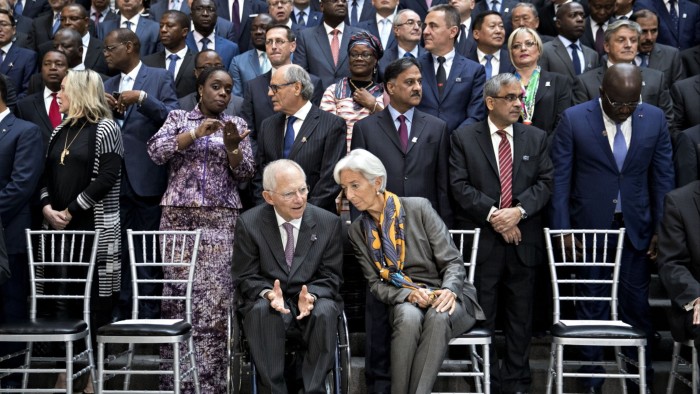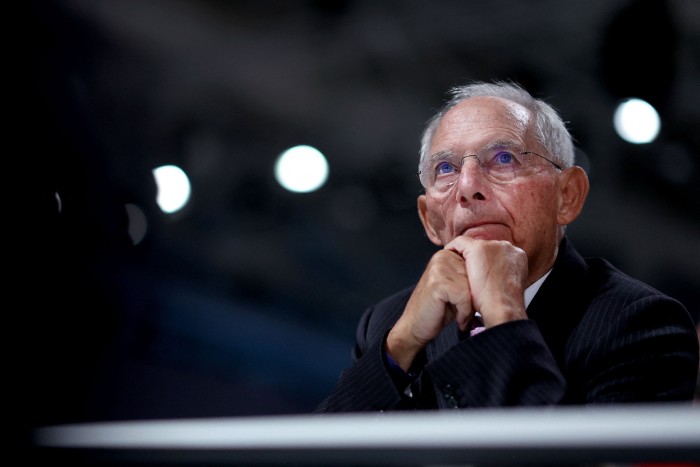From the late 1980s until the 2010s, few politicians in the democratic world have shaped the course of European history more profoundly than Wolfgang Schäuble, the German statesman who has died at the age of 81.
His political acumen, financial experience and understanding of international affairs made him an indispensable aide to Helmut Kohl and Angela Merkel, advisors whom he loyally served as Europe went through its deepest transformation since World War II.
Schäuble was a bold thinker, a master of detail, and a sharp-tongued polemicist. Schäuble won criticism and plaudits when he charted the German response to the collapse of communism in Eastern Europe in 1989, designed road maps for closer integration with the European Union in the 1990s and drafted emergency measures. To save the European Monetary Union after 2010.
As Germany's finance minister during the debt and banking crises that threatened the eurozone's survival, Schäuble insisted on strict fiscal discipline as a prerequisite for the multibillion-euro bailouts arranged for Greece and other stricken countries.
However, far from seeing himself as the high priest of austerity, Schäuble emphasized that his fundamental principle was the long-term sustainability of public finances. As he wrote in a column for the Financial Times in 2021, this meant that some large-scale stimulus programs were justified, including the EU's post-pandemic recovery fund, as long as governments accepted that debts would eventually have to be repaid.
Throughout his career, Schäuble demonstrated an iron will to recover from the private and political blows that would have befallen a lesser politician.
After being shot by a mentally ill man at an election rally in 1990, Schäuble was paralyzed from the waist down and used a wheelchair for the three decades when his influence on German politics was at its highest. “I can't change what happened, but as long as I live, I will live,” he said.

A dominant figure in Germany's centre-right Christian Democrats (CDU), Schaeuble succeeded Kohl as leader of the CDU after the party lost the 1998 Bundestag elections and a coalition of Social Democrats and Greens took power. It seemed almost certain that Schäuble would one day become Chancellor, a role for which he seemed extremely qualified.
However, he was forced to resign as party leader in 2000 after a scandal broke out involving illegal financial donations to the CDU. Schaeuble, although he was not at the heart of the case, admitted receiving 100,000 German marks in 1994 from an arms dealer and lobbyist named Karlheinz Schreiber.
The scandal not only destroyed Schaeuble's career, but it led to a generational change in the CDU's upper ranks, putting Merkel in control of the party until her retirement in 2021. After Merkel became chancellor in 2005, Schaeuble served as her interior minister for four years. Years before he took office. As Minister of Finance.
He remained in this position until 2017, and is in fact the second man in her government. He then became President of the Bundestag, a position similar to that of Speaker of the Council in other parliamentary democracies.
At the time of his death, he was the longest-serving member of the legislature, having first been elected to the Bundestag in the former West Germany in 1972.
Schäuble was born on September 18, 1942 near Freiburg in the southwestern state of Baden-Württemberg, the son of a local Christian Democratic Union politician, and studied economics and law. After writing his thesis on the professional legal status of auditors, he entered the German parliament (the Bundestag) and soon became a close associate of Kohl, a rising star in the CDU in the 1970s. Schäuble married Ingeborg Hensel and they had four children.

During Kohl's chancellorship from 1982–1998, Schäuble developed particular expertise in the political and economic conditions in communist East Germany, which made him the obvious candidate to lead the West German team during negotiations on German reunification after the fall of the Berlin Wall in 1989.
Reunification brought massive social and economic upheaval in the East, but after 30 years, Schäuble It was confirmed in a newspaper article That East Germans should be proud of their progress. “Some maintain their victim status, rather than confidently pointing to their valuable experience in adapting to massive social upheavals, compared to the West,” he wrote.
In 1994, he and Karl Lammers, a fellow CDU politician, caused a storm recommendation And that European political and economic integration must proceed with a “hard core” of countries at its heart – specifically, Germany, France and the Benelux Trio. This proposal achieved no results because it greatly offended Italy and Spain and did not gain any support in Paris.
However, Schäuble returned to these ideas some twenty years later, proposing that the eurozone should be more centralized, with its own legislative assembly and commissioner empowered to reject national budgets that violate common fiscal rules.

During the eurozone debt crisis, Schäuble broke with the official line adopted by the German government when he suggested that Greece should take “a few years' reprieve” from club membership. Merkel and other European leaders rejected the idea, fearing it would call into question the irreversibility of the currency union.
Finance ministers and bankers in other EU countries remembered Schäuble for his clear language. After a 2010 ban on certain types of speculation in financial markets, he said: “If you want to drain a swamp, don't necessarily ask frogs if you want an objective judgement.”
“He has a wicked, very acidic sense of humour,” said George Papakonstantinou, Greece's finance minister at the start of the debt crisis. He recalls Schäuble asking him, in an apparent reference to Greece's massive budget deficit: “Are you a real finance minister?”

One day, Schäuble said to Christine Lagarde, his French counterpart, who later became managing director of the International Monetary Fund and head of the European Central Bank: “You have more experience, you worked at a big American law firm, you had a great career, and you played an important role.” A big role in France, but I understand politics much better than you.”
Schäuble himself admitted that he sometimes “got on my colleagues' nerves.”
In a tribute, German Chancellor Olaf Scholz said: “Germany has lost a sharp thinker, a passionate politician and a feisty democrat.”

“Infuriatingly humble analyst. Bacon maven. Proud food specialist. Certified reader. Avid writer. Zombie advocate. Incurable problem solver.”
